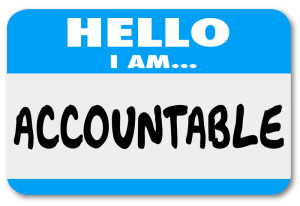 The ‘evolution of work’ suggests that the amount of control people have over their work influences their accountability for their work and their enthusiasm in their work. As you can deduce, the more control a person has over their work, including decisions affecting how they do their work, directly influences their attitude. People want influence. When people feel like their voice is heard, their investment in their work increases far more than when they’re being told what to do and exactly how to do it.
The ‘evolution of work’ suggests that the amount of control people have over their work influences their accountability for their work and their enthusiasm in their work. As you can deduce, the more control a person has over their work, including decisions affecting how they do their work, directly influences their attitude. People want influence. When people feel like their voice is heard, their investment in their work increases far more than when they’re being told what to do and exactly how to do it.
Attitude is often determined by how leaders behave. Often I hear that leaders might think that demanding accountability, letting others make the decisions, or giving ‘pep talks’ would make a difference. Folkman discovered in looking at 360-degree assessments from 40,000 leaders that the most effective leaders (upper 10%) had eight common traits that were linked to higher personal accountability. Folkman lists them as follows:
- Drive for Results. It has been my experience that we can send multiple messages about what is critical and who is responsible for what. Being clear about what people are responsible for and the results that you want is foundational to getting better accountability.
- Honesty and Integrity. In a meeting with your peers the question is asked of you, “how’s that project coming?” Do you honestly reply, “we are really behind” or “pretty good?” Those who are accountable have the courage to tell the truth. This courage is often reinforced because people see their managers being open and direct with them.
- Trust. Research shows that leaders who are not trusted by their reports were found to have the following issues:
- No confidence that their efforts will be rewarded
- They suspect the leader may take advantage of them
- They constantly question the leader’s motives
- A history of leaders taking credit for their accomplishments
These are not factors that will build accountability. In contrast, the three pillars that build trust are positive relationships, knowledge, and consistency.
- Clear Vision and Direction. In my experience, lack of clarity and direction are a chief problem in creating an atmosphere of accountability. Often, we can watch people running at high speed after the urgent, totally ignoring the important, and then wondering why they aren’t executing better. It is tied to understanding and integrating the vision of the organization into every day habits that focus on the purpose for why you exist. This only happens when everyone is clear about the vision and the direction for the organization. This is true at the personal level and the corporate level.
- Problem Solving and Technical Expertise. If we want our people to be better problem solvers we need to teach them the skills and give them the training for their job. Then, setting the expectations for results is much easier.
- Communication. Many of those I coach want to be a better communicator. Understanding what you want to communicate, to whom, and how often is critical. Creating better accountability through communication requires being able to tell, ask, and listen to others.
- Ability to Change. Folkman found that people who are really good at creating change in an organization had employees who are operating at higher levels of accountability. Leaders who are good at instituting change are effective at: accepting feedback, taking on challenges, innovating, spreading optimism, showing concern, and setting clear goals.
- Collaboration and Resolving Conflict.Collaboration is a difficult skill to achieve in an organization. Often we see more competition and conflict than we do collaboration. Peter Blow at Columbia University found that teams who collaborate and are cooperative are far more successful and more accountable. Setting the tone of collaboration is a leader’s job. Resolving conflict in a way that fosters collaboration is often key in achieving greater results. That said, I am not one that believes there is no place for competition. Competition in fostering greater individual improvement in results and skill has its place. I don’t believe in competition that drives divisiveness and lack of team work.
Accountability begins with you. Whether in your personal life, or in your business life, the ability for people to ‘count on’ you to do what you say you will do is a foundational trait to greater success and satisfaction. Which of the eight areas of behavior holds the greatest opportunity for you personally and professionally? Is there one that offers a dual opportunity? Understand that the lack of accountability can become the fatal flaw that stalls your personal life and your business life.
